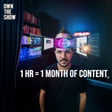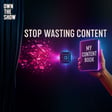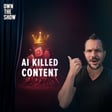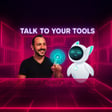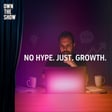Become a Creator today!Start creating today - Share your story with the world!
Start for free
00:00:00
00:00:01

Master AI Faster, Beat The Overwhelm, & Automate Your Work
In this AI marketing podcast episode, Dan Sanchez maps out the four-stage journey every marketer travels on the road from AI‑curious newbie to automation master—sharing real‑world insights from 24 listener coaching calls, the tools he recommends most, and why custom GPTs are the muscle‑building reps you can’t skip.
My Favorite AI Tools
- ChatGPT - https://openai.com/
- High Level Marketing Platform - https://danchez.com/highlevel
- AI Podcasting Tools - https://danchez.com/podtools
- n8n AI Automation Platform - https://danchez.com/n8n
Resources Mentioned
- Suno - https://suno.ai/
- Make.com - https://www.make.com/
- Lovable (vibe‑coding site builder) - https://lovable.so/
- Replit - https://replit.com/
- Zencastr - https://zencastr.com/
- Advanced Guide to Custom GPTs: https://www.youtube.com/watch?v=8DJUfuWohfE
- AI Fundamentals Course: https://danchez.com/courses/ai-fundamentals/
Timestamps
- 0:00 – Why marketers need an AI learning roadmap
- 3:40 – Beginner vs. Intermediate: the $20 "take‑my‑money" moment
- 10:55 – Custom GPTs: from first build to a dozen specialist bots
- 18:30 – Advanced → Mastery: n8n, Make & vibe‑coding your own tools
- 24:45 – Two recurring recommendations: podcasting & High Level
- 30:00 – Listener trend: optimism beats anxiety about AI
- 33:40 – Final charge: be human‑first, AI‑driven
Transcript
Simplifying AI Mastery for Marketers
00:00:00
Speaker
I know that you're hungry to learn as much as you can about AI, but there's just so little time in the week to learn it, right? In this episode, I wanted to simplify that path to mastering AI so that you could focus on just the chunk that you need in those precious few hours that you have to learn this new thing called artificial intelligence for marketing.
Host Dan Sanchez Shares Listener Insights
00:00:21
Speaker
Welcome back to the AI-Driven Marketer. I'm Dan Sanchez. My friends call me Danchez. Normally, this weekly segment is reserved for Bot Bros, where I co-host a whole episode with my brother to cover what's going on in the news and social and everything that's relevant in the AI world for marketers.
00:00:37
Speaker
But Travis is finishing up vacation, so this is just going to be a solo episode for me. But this is a special episode because last week I put out a call to all of you... to spend some time together and I've met with about two dozen of you so far and in meeting with you I've had a ton of fun I've got to known just a ton of what your guys's journeys look like what you're working on you guys have been surprised me impressed me I've learned some things from you ah that I want to share in this episode but mostly I've learned what the trend is I've seen where people are getting stuck and I gotta say
00:01:13
Speaker
all of you all are pretty advanced, okay? Like everybody who's listening to the show, you're definitely above average compared to like the normal people that are asking me questions at live events and who are just getting started with AI.
00:01:26
Speaker
um I actually did a poll on LinkedIn recently and I found that about 75% of my audience at least pays for ChatGPT. And there's a good chunk more that are paying for like a pro license or an enterprise or a team's license for their
Advanced AI Audience and Learning Trends
00:01:40
Speaker
whole teams.
00:01:40
Speaker
So that shows me that this, This audience for the AI driver marketer is not a beginner audience, which kind of makes sense. I mean, I'm a nerd. We're all nerds here.
00:01:51
Speaker
I like going to the deep end. Maybe that's why you like following the show. i don't know. um But I've learned a lot about where y'all are getting stuck. And I wanted to use this episode as a time to share some of the advice I've given to many others now so that I can help you identify just the right next step.
00:02:08
Speaker
I'm also going to talk about a few of the common recommendations I've given and a few of the common tools that I find that I'm recommending over and over and over again in these meetings. Now, I still have more meetings to go. i've I've closed down the link because I can only i can only set aside so many afternoons of of time before I got to get back to work and and and build some stuff.
00:02:27
Speaker
um But I do have a few more meetings with you all this next week. um But again, I've met with 24 and there's definitely consistencies from meeting to meeting ah that I'd love to share with all of you today.
Phases from Beginner to AI Mastery
00:02:40
Speaker
So for starters, let's talk about the different phases of what it looks like to master AI as a marketer. Now, there's different journeys out there. ah the the math The path to mastering AI as a developer is much different than what you do as a marketer. Marketers, we're trying to master AI to at a practical level. We are users of the tool versus developers are often building the tools, and their path looks very different.
00:03:05
Speaker
Our path looks a lot like this. What I'm considering beginner is anybody who's using something like ChatGPT often, could be gemini could be grok but you're just using the free app right and you're using it occasionally just generally weekly um but you haven't found enough ah uses for in order to justify forking over that 20 a month uh for the premium app whether it's a like clod or grok but generally it's chat gpt right
00:03:37
Speaker
um I found that most people step over into the intermediate skill level when the $20 a month is like, no brainer, take my money, chat GPT, take my money, open AI.
00:03:48
Speaker
um Generally, that's a good marker of somebody who's using it enough across their their work life or their personal life in order to make that $20 just seem like it's nothing. It's a low barrier of entry, but it's it's a significant one because you got to remember most people are beginners.
00:04:05
Speaker
who are using AI at all, right? Some people aren aren't even beginners. They haven't even haven't even downloaded the app or heart they haven't even created a ChatGPT account. Those people haven't even started their journey yet.
00:04:16
Speaker
But if you're paying for it, you're not just a beginner, you're an intermediate, and you're now in the stage where you're starting to not just...
Transitioning from Intermediate to Advanced AI
00:04:22
Speaker
ah use AI more but you're starting to explore different modalities you're starting to explore different models within there and that starts to go show the path from intermediate to advanced okay The path, and that's where most of you are at. so Most of you are in this intermediate to advanced stage, and some of you are in what I'm calling the advanced to mastery stage. okay
00:04:48
Speaker
so Let's spend a little bit more time on this segment because, again, most of you are paying for Everybody who met with me was paying for it. I don't think I met with a single person who wasn't paying for some AI tool. so Here's the plan if you are paying for it, but the next stage up is you haven't created a custom GPT yet.
00:05:08
Speaker
That is another significant marker ah that if you haven't created that yet, you're still in the intermediate to advanced stage. um And I'm often recommending people to explore more because when you're on the free stage, you didn't have access to a lot of different tools. But once you're paying for it, you have access to different modalities, different reasoning models.
00:05:28
Speaker
um You have access to projects for the first time, custom GPTs, different types of AI tools. You're usually even exploring different tools. things outside of ChatGPT. Maybe you're getting into Suno for music or you're starting to use other specialty image creation tools, maybe even a video tool because you're exploring these things.
00:05:48
Speaker
You're generally still in an exploration mode um even though you're using the writing tools more consistently. You're trying to even try out different things like deep research now. And this is a really important part of that stage of the journey. So if you're in if you haven't created a custom GPT yet,
00:06:05
Speaker
This is where you're at. You're trying to work your way towards building a custom GPT.
Building and Automating with Custom GPTs
00:06:10
Speaker
um The reason why custom GPTs are so important too is because generally they're actually really simple.
00:06:16
Speaker
They're not hard. They don't take any programming and just require you to have a use case that's so good and so common for you that you want to try to speed it up by telling and training AI to do this one thing over and over again, then you set it aside for a custom GPT.
00:06:32
Speaker
But in general, when you're in the intermediate stage, you want to start becoming familiar with all the tools in your account. um I find that there are some personalities to take to this more more readily than others. There are some people that like you pay for it, but you never move beyond the 4.0 model within your account. You just use it over and over and over again, and you're happy. You're like, it's working. It's great.
00:06:55
Speaker
What more do I need? Ah, but that's where you need to actually expand out. And honestly, let's open your app and click every single button. Go into the settings and explore every single menu item.
00:07:08
Speaker
Figure out what they're there for. Start exploring the different features. Go watch a dozen different YouTube videos about the different features within just the one app that you're using, generally ChatGPT.
00:07:19
Speaker
like Watch a single video on deep reachers deep research. Watch a video about how to maximize the settings of ChatGPT. Watch a YouTube video on how to use the Canvas tool properly. Watch a YouTube video on how to build your first custom GPT.
00:07:35
Speaker
You're in exploratory mode. You're not going deep, but you're still going broad, but you're starting to go deeper than a beginner. A beginner is just trying to figure out how to use the basics of it, how to understand the difference between ChatGPT and Google.
00:07:47
Speaker
In the intermediate mode, you're exploring all the different nuanced tools of something like ChatGPT and learning how to begin to use them and where they fit into your work, where they fit into your life. This is the important part of the intermediate stage.
00:08:00
Speaker
Now at the advanced stage, you are now beginning to build custom GPTs. And the difference between someone who's just leaving intermediate to now becoming like starting to master is really the amount of custom GPTs.
00:08:13
Speaker
Because I've met a few of you, you're starting to build one, two of them, but you need to start building more. The big difference between exploring the different tools in ChatGPT and building custom GPTs is process.
00:08:27
Speaker
the most frequently stated thing that a lot of people i was meeting with of things that they wanted to learn was how to do automation and how to build systematic processes around AI and building custom GPT is where you do that. This is the training ground for building more advanced automations later on because if you haven't built at least a custom a dozen custom GPTs, you're not ready for the automations. The jump from building custom GPTs to building advanced automations with make and NNN is a significant jump in complexity.
00:09:01
Speaker
um And you don't, you don't trust me, you do not want to jump from having no custom GPTs to jumping onto make, you will get frustrated, you you just won't put the time into learning the tool because it's they're they're difficult. They're actually they're pretty hard.
00:09:15
Speaker
I'm pretty good at automation and it takes me a long time to build build those automations out in them. So I highly recommend putting in the time into custom GPTs because they're pretty simple. Now, a common thing that I'm having to explain ah over and over again, I really should do a full episode on this, and I think I will um because it's it's worth
Developing Processes for Custom GPTs
00:09:34
Speaker
differentiating. But here's the summary.
00:09:36
Speaker
There's two different kinds of custom GPTs. it's Custom GPTs are a broad tool, but there's generally two different ways that I'm using it. And I'm calling it the generalist custom GPT and the specialist custom GPT. And it's like a marketing generalist or a marketing specialist, right?
00:09:51
Speaker
A generalist can accomplish many different tasks and is often armed with just some broad knowledge about a topic. For example, I recommend everybody should build a what I call a brand bot, essentially a custom GPT where you have the instruction area just armed with basic information. It says it might start off with a line like, hey, you're a ah marketing strategist that helps the brand team of insert your brand name, right?
00:10:15
Speaker
with ah creating all kinds of marketing assets and collateral. Here's some things you need to know about the company. And then you have like the company's industry, your company's brand items, your style guide, your writing style, ah do's, don'ts, like products and services that you offer. All the basic information that like a new employee would need to know and or or even a freelancer would need to know about your company in order to do good work for it. That way you don't have to re-explain that every time. Like you're using...
00:10:45
Speaker
vanilla chat GPT or just you know like the way you most of us used it in the beginning, ah usually have to give it all that context in order to create a blog post or a product update about something about your company. right But now if it's all loaded in a custom GPT, you don't have to re-explain it. It's more of a time-saving mechanism more than anything.
00:11:04
Speaker
Generally, anything you can do in a custom GPT, you can also just do in normal chat GPT, but you're saving time by not having to re-explain it and create a huge advanced prompt library.
00:11:16
Speaker
Instead, you just load it into a custom GPT and then you just delegate knowing that it already has the context. And that's a general generalist GPT. A specialist custom GPT does one thing, and it does it really well, and it only does that thing. I have many of these.
00:11:33
Speaker
um A long time ago released a custom GPT called My Showrunner. It's probably the best example of it. You can go to myshowrunner.com. I co-developed that with Susan Diaz, and all all it does is one thing. It's not a journalist tool. It only helps me prep ah for new guests that I have on this podcast, which I don't have a lot of guests often on the show anymore, but when I was...
00:11:55
Speaker
I would quickly use this one custom GPT ad, pull it up, paste in the guest LinkedIn profile. It would scan the profile, do some online research, build out a whole summary for the guest and be like, cool, what would you like to talk to this guest about?
00:12:07
Speaker
I would give ah the custom GPT ad. an angle or say like, oh I'm not sure yet. I just am really excited to talk to him. And it would come up based on the show premise because it's already known. and It already knows the premise of the show. It's in the and the instructions.
00:12:20
Speaker
And then it would take the research it had done to come up with five different angles. And I would just pick one. Ooh, three. It would then take that angle and then write 10 titles for that episode. I would be like ooh, I like title two, but change this last word on there it'd great.
00:12:34
Speaker
And then from that title, it would write the whole show outline from the intro, the questions, and the outro. And it would ask me, is this good? And I would say, yes. See, it's walking through a step-by-step process, and these are the most powerful versions of custom GPTs.
00:12:47
Speaker
Because we all have things that we're doing on a daily, a weekly, a monthly, even a quarterly annual basis that we can actually automate a lot with AI. That example of what I was just walking through with my showrunner, that that guest prep that I would have to do for every single guest interview, that usually took me 30, 45 minutes to do of sitting down and thinking through what I was going to talk to that guest about.
00:13:10
Speaker
But with this custom GPT, I've essentially mapped my process for guest interviews and told it to run through it step by step. Um...
00:13:21
Speaker
in a way that didn't require reasoning from the AI. So I'm usually, 4.0 is the model that runs custom GPTs, but it's fine because in the custom GPTs, you're essentially baking your reasoning, step-by-step reasoning through a more complex task or project and then coding it, into not coding it, you're just giving clear instructions on how to do it so that you don't have to do it anymore. You can essentially just direct and give it feedback.
00:13:48
Speaker
Be like, oh, yeah, number three. Number two, oh, I don't like those titles. Start over again with that step. And then it comes up with more titles, and you're like, okay, that one. And then it moves things forward faster. And if you're a content marketer or you're coming up with case studies, I guarantee like you have a step-by-step process for most of those things that you're doing on a daily, weekly, and monthly basis.
00:14:08
Speaker
But you need to start thinking about breaking it up into baby steps, thinking about what what are the things that you can do versus the things that you can actually delegate to AI. I'm pretty sure... At least 70% of what your processes are can be done by AI or at least sped up by AI.
00:14:24
Speaker
You just need to map it into a custom GPT. Now, I don't want to break down the full process to doing this. Check out my AI fundamentals course ah that will actually break it down really smoothly. If because if you're totally new to custom GPTs, go through my fundamentals course. I will break it down step by step on how to get started.
00:14:40
Speaker
I also have a more advanced video about around what I call the ah when do ask process. model of building these specialist custom GPTs. I will link both of these things, the the AI fundamentals course and this advanced custom GPTs video ah in the show description for this episode. So check those out if that's where you're at and you need to start building custom GPTs. Watch both those videos, watch them slowly, build one alongside me as I'm working through the through it with the video.
00:15:09
Speaker
This is where you're at. um don't watch anything else. Like if you're at the point where you're like, okay, Dan, you've convinced me like custom GPT is where I need to go. I literally have had this conversation multiple times this week.
00:15:23
Speaker
Don't watch anything else. Like don't worry about vibe coding. Don't worry about music. Don't worry about VO3 and all the video stuff. Don't worry about all the other things that are being launched right now. Don't worry about any of those things.
00:15:36
Speaker
Set aside this whole summer, set aside the next couple of months to just focus on building custom GPTs. You will get in so many more productive reps of using AI. And this is usually where the rubber meets the road because we can often just get distracted in watching all these different videos and learning about it, but never actually doing the work.
00:15:57
Speaker
This is where you need to start doing the work of like really getting in the reps to learn AI. It's in this intermediate to advanced stage. This is why when I see someone who has a dozen different custom GPTs, I'm like, you're advanced.
00:16:10
Speaker
And it's not because of the number necessarily, but because by the time they've created a dozen of them, they've found so many more use cases and they've had to refine some of them. They've had to, they've probably built some and then retired them because they found out they didn't work.
00:16:24
Speaker
Ah, but that's where the learning comes from. When you've Try to build something. You have something in your mind. I wonder if AI can help me do this process. And then you try to build it and it doesn't work. You've just learned a huge area of what AI can't do. That's good.
00:16:37
Speaker
um All the process of getting from one to a dozen is long and it's hard. yeah I generally recommend just not just watching the AI fundamentals course in that one video. I recommend go and watch as many videos on YouTube about how to build good custom GPTs as you can.
00:16:51
Speaker
And this is where you need to focus. This is where you can kind of ignore everything else, maybe like briefly watch the news about what's happening AI just to stay informed. um But you can pound and spend those few precious hours you have learning how to really refine your AI muscle by building custom GPTs. This is where the magic happens.
00:17:10
Speaker
And if you can't get it here, you won't get it anywhere else. Because every like all the automation stuff is way more sophisticated than building custom GPTs. ah The technical skill required to build custom GPTs is low.
00:17:22
Speaker
The hard part about building custom GPTs, in my opinion, is not it doesn't have to do with AI. It doesn't even have to do with anything technically marketing. It's actually just process development.
00:17:33
Speaker
And for some people, that comes a little bit more naturally. And for some of you, it's a little bit more difficult. um Trying to break things down into their simple components to be to be able to create an assembly line for the things that you do.
00:17:45
Speaker
This is the hard part, but this is the work. This is the most important lesson that you can learn when it comes to actually ah using AI to do more for you is build is breaking things down into simple processes.
00:17:58
Speaker
A book I would recommend that is pretty good at doing this actually is is The 4-Hour Workweek. The 4-Hour Workweek teaches this really, really well. It's a very common book. I'd be surprised if like like most of you have read this book.
00:18:11
Speaker
Okay. But if you haven't read The 4-Hour Workweek, please go read it. Tim Ferriss does a great job of doing it because you essentially have to turn your job into a very well-driven, well-oiled process in order to delegate it to the point where you can only work four hours a week.
00:18:25
Speaker
So that book is actually a freaking amazing guide on how to use AI marketing because ah The premise behind it, you know, if you've read it and you know it's he's big and into like eliminate, automate, delegate.
00:18:39
Speaker
Well, AI fits into this automate things. AI actually pulls more from the delegate realm into the automate realm than ever before. um But his general way of thinking and approach approaching process development is one of the most approachable I've seen. There's much more technical ways of approaching process development with all kinds of MBA frameworks and all that kind of stuff.
00:19:01
Speaker
Just read Tim Ferriss' book if you want to go deep on this topic because this is – This is the most exciting part of learning AI is learning how to automate processes that you were doing manually and now are happening automatically. The best way to practice it, custom GPTs.
Advanced Automation Techniques for Marketers
00:19:15
Speaker
So that was a long time because this is where most of you are at right now. Now, some of you have built a dozen custom GPTs. And generally, those people um are now trying to figure out not only how to automate AI for themselves, you're starting to go from advanced to mastery.
00:19:33
Speaker
And this is where you're actually starting to dig into the more advanced tools. You're starting to think about n NAN. You're starting to think about make.com. You're starting to think about how to automate more so that you don't have to kick off the process that you do with the custom GPT.
00:19:47
Speaker
um For those of you who are starting in this realm, i warn you I'll warn you, like yeah I recommend NAN over Make. um There's two different versions of NAN. You can actually download it like WordPress and then install it on your own server. There's whole guides and videos to doing this.
00:20:03
Speaker
um There's also just paying for it, like the 20, 25 bucks a month or whatever else is what I do. And they host it and you just use the tool. I recommend that version, the hosted version where they host it, because you have an AI bot in there that will actually help you troubleshoot things as you move along.
00:20:18
Speaker
um And I just, there's tons and tons and tons of videos around how to use NAN and how to build any process out there. So if you want to integrate it with something like Instagram, someone's already made that video and you can follow alongside them. That's what I've been doing.
00:20:30
Speaker
Anybody I know using NAN is watching dozens to hundreds of videos on how to learn the tool. That's the price to pay for learning some of these more advanced automation tools. Yeah, I just said dozens to hundreds.
00:20:43
Speaker
That's, ah like, I haven't even gotten there. I've probably watched two dozen videos on NAN, but I've just learned that, like, okay, because I met somebody recently. I'm going to have him as a guest on the show soon who's made hundreds of automations, and the price to pay is about 100 to 200 videos.
00:20:57
Speaker
ha! That's how much time it takes in order to really learn ah the tool. So that's fine. Now we know the price to pay, and that's that's what we're going to have to do.
00:21:09
Speaker
But with NAN, you can automate just about anything in just about any way and more agentic workflows where AI can actually have more like room to I don't know more tools to play with. So it's not even just one step in an automation platform. AI is able to do more when you're using a tool like NAN.
00:21:26
Speaker
um But it is advanced. It is hard. You do have to get very technical to do it. But if you're at this point and you're hungry for it, this is the way. So another thing you're probably doing at the advanced to mastery stage is you're starting to dabble in vibe coding.
00:21:43
Speaker
Vibe coding is more than just for developers now because AI can write code for you. And fact, I met a few of you that are doing this exceptionally well and really opened my eyes to like...
00:21:54
Speaker
what Vibe Coding can be used for on a more simple level. Because to me, every time I tried Vibe Coding, bunch of tools that do it like Lovable, Bolt, Replit. ah There's a couple of tools to where you could just say, hey, build an app that does X and it'll start building it. But of course, it won't build the full app. You have to kind of think like, oh, well, that's the front end. Like it doesn't have this functionality that I thought it would have. And then you slowly think, can you build this? Can you build this? Can you fix that?
00:22:20
Speaker
And you just talk to and it builds a whole application. um Every time I tried, I kind of failed, but I'd only put like 30 minutes at in a time and multiple times over the last six months. um But it's in watching a few of you vibe code some things that i'm like, oh, like I could do that.
00:22:35
Speaker
Huh. And I'm starting to learn that one of the very few things that I was getting stuck on that I'm like, oh, Vibe Coding's a great solution for this, specifically is landing pages.
00:22:46
Speaker
Landing pages and simple websites are kind of a pain in the butt. Like I have landing page software where it has like a drag and drop thing, but you know, it's like, It's just kind of hard. And it's kind of a pain because like you can have ChatGPT come up with all the copy for like a landing page now and it'd be reasonably good.
00:23:03
Speaker
um But the process of turning that into design and then coding it and then putting in embedding the forms and all that kind of stuff like it was it's probably one of the more time consuming things that AI couldn't help me with.
00:23:14
Speaker
until vibe coding. um So that's something I've learned from you guys, because some of you are just building simple websites with vibe coding. And I lit, I tried it yesterday and I designed a whole one single page landing page yesterday, and it looks fantastic.
00:23:27
Speaker
And I'm like, man, it took me about 60 minutes, maybe 90 minutes to get it done. But it was my first time kind of doing it. I did it on lovable, ah which is a great little vibe coding app. It's very, it's probably one of the simpler ones.
00:23:41
Speaker
Um, but now that I've done it and then I just paid the $20, 25 bucks a month to hook it up to a domain and host it. And I'm like, oh my gosh, this project would have taken me at least four, six, maybe even eight hours to do because it just takes a long time to do it well and do it right.
00:23:56
Speaker
And now I got it done in 90 minutes. And the next time will take me even less time, uh, to build something good. This is good news for you, especially if you don't design. Like I actually know how to design and I don't know how to write HTML and CSS. Like I know how to build landing pages from scratch.
00:24:12
Speaker
um This way is much faster. And you actually don't need to know as much about web design or design itself in order to build pretty nice looking landing pages. Because the cool thing is, is you can be like, hey, I want i want it to look and feel like this website. You put in the yeah URL to that website, it'll scan that website and be like, got it.
00:24:28
Speaker
And it'll do it. It won't be exactly like that website, but you can tell like it's a huge headstart and then you can start just telling it like, oh yeah, make that little darker, a little lighter, move that a little bit to the left and it'll start doing it.
00:24:40
Speaker
It's an amazing thing, but do not start building with vibe codes, vibe coding. Don't start using any of these tools until you've built a custom a dozen custom GPTs. I promise it's more advanced.
00:24:51
Speaker
It's actually easier than the automation stuff I'm starting to find. um But don't do it until you've built the custom until you've progressed through the intermediate stage and then started building like a dozen custom GPTs.
00:25:02
Speaker
Those will take some time to learn all the different ways you can use it. And they can't just be random custom GPTs, by the way. They need to be actually like useful tools that are good. It takes a while to find them all. So start finding processes that you can automate in your job and build them in custom GPTs.
00:25:19
Speaker
And then start dabbling in... NAN automations and vibe coding to build your own applications or your own landing pages or your own websites or whatever little tools that you're going to make. This is where the more advanced marketers are playing. Of course, developers are like starting here like developers, but their developers aren't doing marketing. They're they're developing code and applications. So this is where developers start.
00:25:48
Speaker
So those are generally the four phases on the path towards mastering AI. Again, beginner mode, you don't even pay for ChatGPT yet. Intermediate, you're paying for it, but you haven't built a custom GPT yet. You're now exploring all the advanced tools within ChatGPT or a similar tool.
00:26:07
Speaker
You're intermediate when you've started to become advanced when you've built your first custom custom GPT and you're now building out more use cases for these tools and you're starting to automate a lot more of your different work priorities that you're doing.
00:26:20
Speaker
um And you're starting to get into mastery once you've built a dozen of these custom GPTs and you're starting to leverage tools like Make, n NAN, NAN. and vibe coding tools in order to build out your own custom workflows
Podcasting and High-Level CRM Tools
00:26:32
Speaker
now.
00:26:32
Speaker
That's generally the like rough path in four phases, beginner, intermediate, advanced, and master. So hopefully that kind of gives you a sense of where you're at and what you need to work on next.
00:26:44
Speaker
So double down on that next thing and really learn how to get the most out of it and just stay focused on that one thing until you get to the next marker. Now, a couple of recommendations that I was just making over and over and over again, because oftentimes we're talking about AI marketing, and we just end up talking about marketing in general and ways you could be doing better marketing.
00:27:06
Speaker
And I found I was recommending two things over and over again. One of them was just podcasting. because a common question that comes up is, Dan, what how could I be using AI to automate or simplify my content marketing?
00:27:17
Speaker
And I ended up coming back to podcasting over and over again. It's not just because I love this medium, but I love it for a reason. I love it because it's effective, it's efficient, and it's the easiest way to get content into the world because it's it's starting with video.
00:27:30
Speaker
Like I specifically always recommend video podcasts like this podcast. I do it because it's easier to step into a microphone um in order to speak than it is to like outline a whole blog post. Unless you're a very competent writer, some writers can outline a blog post faster than you get a whole podcast up episode down. But if if you put the right tools in place like Zencastr and automate the process and then start automating the backend with custom GPTs, or at least even the front end, like preparing for it with custom GPTs, distribution and creating the content with custom GPTs,
00:27:58
Speaker
Then the whole process of podcasting simplifies everything else. You need a weekly blog? ah Interview your subject matter experts on a podcast and have AI turn that transcript into a blog post. You need thought leadership, social media, same process, but you're now repurposing it into a blog post and social media.
00:28:15
Speaker
um you need to get your founder in front of more things, interview them on a podcast. It's like everything comes down to interviews, right? Because that's the thing that makes journalism and the news and all that kind of stuff go round, unless you're the subject matter yourself, but then just get in front of the microphone and the camera yourself and start recording.
00:28:33
Speaker
Answer people's questions. Take one question that your audience has and just answer it in one episode and that's done. um come up with and You can come up with interesting segments for AI like I do with Bot Bros covering the news. I'm kind of reacting to what's going on in the world and giving my spin on it, right?
00:28:48
Speaker
There's so many different ways to approach content, especially when you start with the podcast. There was one... um CMO I talked to that was talking about how to automate the newsletter. Because even if you're using a bunch of custom GPTs and different pieces, newsletters are usually a combination of different elements, different ah segments that you're putting together into one piece called a newsletter.
00:29:09
Speaker
And even if you're using AI, it can be kind of frustrating. I was like, yeah, but I even reverse engineer my podcast in order to build my newsletter. In fact, Bot Bros, like I literally invented Bot Bros as a way to simplify the newsletter creation.
00:29:24
Speaker
All the segments of Bot Bros I invented because I wanted to be able to have a variety of different types of content that ChatGPT could easily recognize and then turn into a newsletter. So if you're subscribed to the newsletter, if you go to news.aidrivenmarketer.com, you will quickly see that the newsletter follows the exact same outline as Bot Bros.
00:29:48
Speaker
the podcast episode. I did that intentionally because I hate writing newsletters, but I love podcasting and podcasting is a lot easier for at least, at least for me than newsletters. So I host the weekly show with Travis in order to develop the content for the newsletter.
00:30:06
Speaker
Maybe I cheapen the newsletter for you. I don't know, but I find that that was the most efficient way and it's a f freaking good newsletter. Um, so yeah, I reverse podcast to come up with all the other content. And I find it's the easiest way. i don't have to promote the podcast before it comes out.
00:30:21
Speaker
It comes out, I promote it in the in in after it comes out. And it's easier because it's available to listen to on demand right now in all the different formats that it can come. You can even promote it days, weeks later.
00:30:32
Speaker
Like I'm promoting that custom GPT episode I'm going link to in the episode. It's an asset that I now can tie in back to. That's why I recommend podcasts all the time. It's one of the best tools to automate the rest of your content for content marketing.
00:30:44
Speaker
So that was one recommendation. The second most frequent ah recommendation that I'm making on these these conversations is high level. Yes, all the time. Oftentimes, y'all getting stuck on things that require a CRM or a marketing so solution that has AI built into it, whether it's to handle incoming phone calls and an AI voice takeover to address the leads that you're getting, or you're either starting an agency or are...
00:31:14
Speaker
actively building an agency and you don't have like a tech backend to quickly redeploy what you're building high level like i keep recommending it because it's powerful uh and it's and it's very inexpensive for all the power that it has the one the one downside to it and i'm sharing this with individuals with many of you on is that it's powerful but and anytime you have a software that can do a lot means that there's a lot to learn So that's one of the downsides of high levels. There's a lot in there and it does take a while to kind of learn how it all works together, but it really handles all of your marketing.
00:31:47
Speaker
Uh, I have it, uh, until I started vibe coding landing pages, it has a great funnel builder in there. Uh, it does the whole Sierra marketing automation thing and has AI tools in there. Like some of the episodes that I've been publishing out on it.
00:32:00
Speaker
Um, a number of you have asked me about high level on these phone, on these calls and have reached out to me personally about high level being like, Hey, like you've been recommending high level. Tell me more about that. Um, if you,
00:32:12
Speaker
just need to talk to somebody about it, you're like, I'm not sure if it's right for me. I'd be happy to talk to you about it and take take a call just to kind of like demo how I'm using it and talking about it. i The reason why I love that they're a sponsor and the white reason why I recommend it so much is because I was using it. I loved it. And I finally found like the perfect all-in-one tool that covers most of the bases.
00:32:33
Speaker
When it comes to like all the marketing tools, because I, ah you know, you just get tired of integrating things and then they stop integrating and then one updates, but the other one doesn't. It's just a freaking mess. So I like having an all in one um to simplify the process because I like using the tools, not being used by the tools, you know.
00:32:51
Speaker
But there is a learning curve to it. So if you want to talk to about it, like reach out to me on LinkedIn. It's linkedin.com slash IN slash digital marketing. Dan, shoot me a DM or connect with me, then shoot me a DM.
00:33:02
Speaker
I'd be happy to set up a time to walk you through how I'm using it and why I recommend it. Because I i will tell you the
Community Engagement and Optimism in AI
00:33:08
Speaker
good, the bad, the ugly. One of the ugly parts is there's a lot to learn. So that is what it is. um but But I'm recommending it over and over again, not just because I'm sponsored, but because it's just a helpful tool.
00:33:19
Speaker
And I found it it's helping and fixing a lot of my marketing issues. so And lastly, one question that I'm asking over and over again, and I'm getting a very consistent answer, just makes me so happy, is that I'm asking, how does AI make you feel about the future?
00:33:36
Speaker
And the vast majority of you are excited. Me too. There are certainly a few of you that have that are excited and hesitant as well because obviously AI will have some downsides as well as some major upsides.
00:33:49
Speaker
And that's kind of where I'm at too. But for the vast majority of everybody showing up to these calls, it makes sense because you're showing up to listen spend some of your precious time listening to an AI marketing podcast. Like, come on.
00:34:02
Speaker
Yeah. You ain't showing up if you don't have some really good, like really big hope about what this is going to do for you, your career and the world. Right. So it's just exciting to meet and talk to other people that are excited about this same topic.
00:34:16
Speaker
So thank you so much for listening. ah I'm so glad that what we're sharing here on the show is helpful to you. Please. I love connecting with all of you while I can't always open up my calendar for 30 minute meetings.
00:34:31
Speaker
I'm generally always available on LinkedIn via DM. Just send me a DM, a question, a thought, a thing. ah People send me tools all the time. Generally, I haven't heard of it. um But I try to be as helpful as I can. LinkedIn is where I'm the most engaged and active. So find me on LinkedIn. Shoot me a DM, even if it's only to say, hey...
00:34:54
Speaker
I heard you do a shout shout out and call out on your show and just wanted to say thank you or something like that. It always means the world to me to hear from you. So again, for those who have I've been meeting with over the last week, thank you so much for taking some time. I've enjoyed like immensely getting to know all of you, hearing your stories, seeing the cool things that you're doing with AI.
00:35:14
Speaker
ah Let's continue to lean into that optimism because if we don't, then think about the people who do lead with it. We want to lead with hope. We want to lead with human, be human first, yet AI driven.
00:35:28
Speaker
And if we can actually learn this thing first, then I think we can set that change, be that change we want to see in the world, right? Like the classic Gandhi quote. So let's do that.
00:35:39
Speaker
Let's lean in with the optimism, build some cool stuff, and learn how to be more productive with AI.



![What’s Your Authority Score? [The 5-Factor Test] image](https://media.zencastr.com/cdn-cgi/image/width=112,quality=85/image-files/630c9f06819f8b3dba5fa460/cfbaccba-f587-45de-a41f-e2c99c15e2a5.png)
![The Audience Growth Engine [Full Framework] image](https://media.zencastr.com/cdn-cgi/image/width=112,quality=85/image-files/630c9f06819f8b3dba5fa460/46b84fd1-e856-4687-9aee-6b4a7e0bc7ff.png)


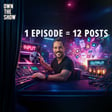
![The "Dream 100" Execution Plan [Google Sheet System] image](https://media.zencastr.com/cdn-cgi/image/width=112,quality=85/image-files/630c9f06819f8b3dba5fa460/fcd89374-76a4-4e58-a2e3-2bb7ddda4364.png)
